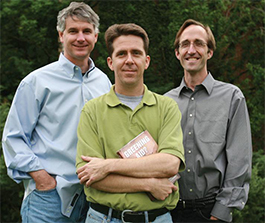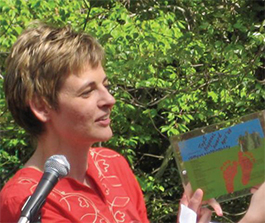Faculty Shorts
 RANDY CHAMBERS, director of the W.M. Keck Environmental Field Lab, participated in interdisciplinary teaching of courses in Wetland Ecosystems (with Jim Perry), Intro to Environmental Science and Policy (with Dennis Taylor), and Watershed Dynamics (with Greg Hancock) this past year. He and his students continue pursuing research interests involving diamondback terrapins in the Chesapeake Bay, invasive plants in tidal wetlands, and nutrient dynamics in the Florida Everglades.
RANDY CHAMBERS, director of the W.M. Keck Environmental Field Lab, participated in interdisciplinary teaching of courses in Wetland Ecosystems (with Jim Perry), Intro to Environmental Science and Policy (with Dennis Taylor), and Watershed Dynamics (with Greg Hancock) this past year. He and his students continue pursuing research interests involving diamondback terrapins in the Chesapeake Bay, invasive plants in tidal wetlands, and nutrient dynamics in the Florida Everglades.
ANDREW FISHER is waiting impatiently for his first book Shadow Tribe: The Making of Columbia River Indian Identity to come out with the University of Washington Press. In the meantime, he's polishing an essay on Northwest Indian religion and resource conservation for a forthcoming anthology about indigenous ecologies and indigenous knowledge. Assuming he gets tenure this year, he may have to shift his research focus from salmon to shad.
REGINA A. ROOT serves on the research council of Raíz Diseño, a transnational NGO network of sustainable designers, and the environment section of the Latin American Studies Association. Last year, she published two articles on Latin American women environmental writers, edited a volume on Ecofashion (Berg Publishers, 2008), and presented a fi rst glimpse of her English translation of Anacristina Rossi's Mad About Gandoca, a bestselling novel that saved a Costa Rican ecological refuge from development for tourism, in Interdisciplinary Studies of Literature and Environment 14.2 (Winter 2008): 195-215. Currently, Root is at work on an international handbook on fashion studies with colleagues at the London College of Fashion as well as a collaborative project with Tonya Boone of the Mason School of Business on quality and the process informing sustainable design endeavors; she will teach a course on Ethical Fashion as part of the Sharpe Program this fall.
JOHN SWADDLE is back from a wonderful sabbatical year at the National Center for Ecological Analysis and Synthesis at UC Santa Barbara (oh my, what a beautiful place to live) and continuing to work on projects related to the impacts of noise pollution on wildlife, the infl uence of biodiversity on the spread of infectious diseases, and is starting new projects investigating the use of free-living algae as super-effi cient sources of biofuels, and studying the infl uence of mercury contamination on song birds. I am also loving being a new Dad, and little Lyra is growing like crazy, as any self-respecting two-year-old should be. I now know all the words to every song in Mary Poppins.
 TIMMONS ROBERTS. In July 2008, Timmons published Greening Aid? Understanding the Environmental Impact of Foreign Assistance with professors MIKE TIERNEY (government) and ROB HICKS (economics) and W&M alum BRAD PARKS '03. He is a principal investigator on the Project-Level Aid research project, which received nearly $2 million in funding from the Gates and Hewlett foundations to improve the information about foreign aid from all donor nations to the developing world. His current work is about how to fairly raise and distribute funding for poorer nations to adapt to the impacts of climate change, and to "decarbonize" their economies. In July 2009 he will begin a position as the director at Brown University's Center for Environmental Studies. He would like to express his gratitude to the amazing students and faculty of William and Mary's environmental science and policy program.
TIMMONS ROBERTS. In July 2008, Timmons published Greening Aid? Understanding the Environmental Impact of Foreign Assistance with professors MIKE TIERNEY (government) and ROB HICKS (economics) and W&M alum BRAD PARKS '03. He is a principal investigator on the Project-Level Aid research project, which received nearly $2 million in funding from the Gates and Hewlett foundations to improve the information about foreign aid from all donor nations to the developing world. His current work is about how to fairly raise and distribute funding for poorer nations to adapt to the impacts of climate change, and to "decarbonize" their economies. In July 2009 he will begin a position as the director at Brown University's Center for Environmental Studies. He would like to express his gratitude to the amazing students and faculty of William and Mary's environmental science and policy program.
 MARIA IVANOVA (government) is convening a Global Environmental Governance Forum: Reflecting on the Past, Moving into the Future (see www.environmentalgovernance.org/forum), which will bring together the past, present, and future architects of the environmental governance system in an effort to connect generations of environmental leaders and draft a blueprint for reforming the international environmental institutions. In February 2009, Maria Ivanova and one of her research assistants, Clare Stankwitz '11, participated in the UN Environment Programme's Governing Council/Global Ministerial Environment Forum in Nairobi, Kenya, and produced an educational video-Global Environmental Governance: a Quest for Symphony. Most recently, Professor Ivanova was awarded a prestigious year-long fellowship at the Woodrow Wilson International Center for Scholars in Washington, D.C., to conduct in-depth research and analysis of the evolution of U.S. international environmental policy over the past 40 years.
MARIA IVANOVA (government) is convening a Global Environmental Governance Forum: Reflecting on the Past, Moving into the Future (see www.environmentalgovernance.org/forum), which will bring together the past, present, and future architects of the environmental governance system in an effort to connect generations of environmental leaders and draft a blueprint for reforming the international environmental institutions. In February 2009, Maria Ivanova and one of her research assistants, Clare Stankwitz '11, participated in the UN Environment Programme's Governing Council/Global Ministerial Environment Forum in Nairobi, Kenya, and produced an educational video-Global Environmental Governance: a Quest for Symphony. Most recently, Professor Ivanova was awarded a prestigious year-long fellowship at the Woodrow Wilson International Center for Scholars in Washington, D.C., to conduct in-depth research and analysis of the evolution of U.S. international environmental policy over the past 40 years.














